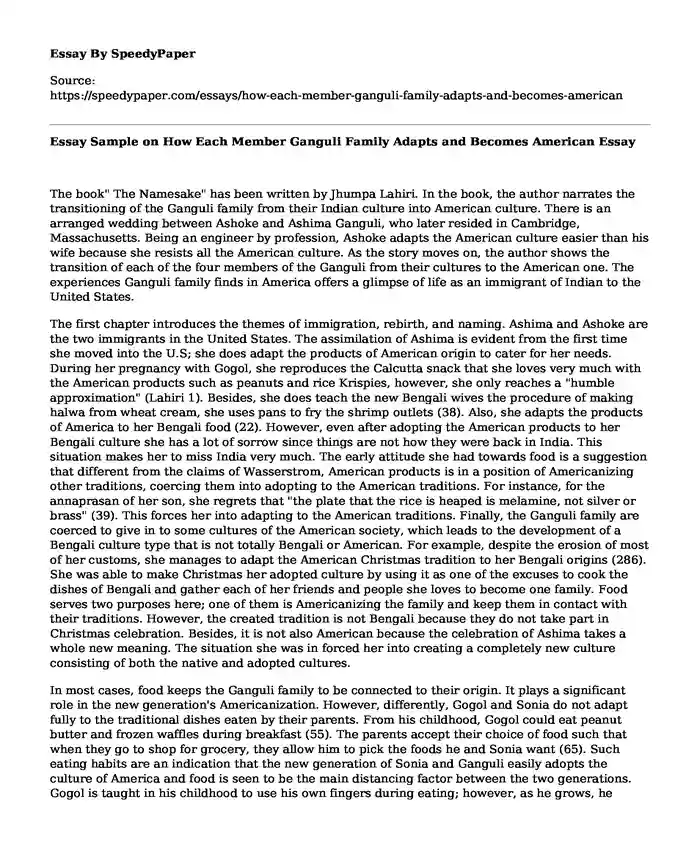
| Essay type: | Book review |
| Categories: | United States Immigration Family Books |
| Pages: | 4 |
| Wordcount: | 828 words |
The book" The Namesake" has been written by Jhumpa Lahiri. In the book, the author narrates the transitioning of the Ganguli family from their Indian culture into American culture. There is an arranged wedding between Ashoke and Ashima Ganguli, who later resided in Cambridge, Massachusetts. Being an engineer by profession, Ashoke adapts the American culture easier than his wife because she resists all the American culture. As the story moves on, the author shows the transition of each of the four members of the Ganguli from their cultures to the American one. The experiences Ganguli family finds in America offers a glimpse of life as an immigrant of Indian to the United States.
The first chapter introduces the themes of immigration, rebirth, and naming. Ashima and Ashoke are the two immigrants in the United States. The assimilation of Ashima is evident from the first time she moved into the U.S; she does adapt the products of American origin to cater for her needs. During her pregnancy with Gogol, she reproduces the Calcutta snack that she loves very much with the American products such as peanuts and rice Krispies, however, she only reaches a "humble approximation" (Lahiri 1). Besides, she does teach the new Bengali wives the procedure of making halwa from wheat cream, she uses pans to fry the shrimp outlets (38). Also, she adapts the products of America to her Bengali food (22). However, even after adopting the American products to her Bengali culture she has a lot of sorrow since things are not how they were back in India. This situation makes her to miss India very much. The early attitude she had towards food is a suggestion that different from the claims of Wasserstrom, American products is in a position of Americanizing other traditions, coercing them into adopting to the American traditions. For instance, for the annaprasan of her son, she regrets that "the plate that the rice is heaped is melamine, not silver or brass" (39). This forces her into adapting to the American traditions. Finally, the Ganguli family are coerced to give in to some cultures of the American society, which leads to the development of a Bengali culture type that is not totally Bengali or American. For example, despite the erosion of most of her customs, she manages to adapt the American Christmas tradition to her Bengali origins (286). She was able to make Christmas her adopted culture by using it as one of the excuses to cook the dishes of Bengali and gather each of her friends and people she loves to become one family. Food serves two purposes here; one of them is Americanizing the family and keep them in contact with their traditions. However, the created tradition is not Bengali because they do not take part in Christmas celebration. Besides, it is not also American because the celebration of Ashima takes a whole new meaning. The situation she was in forced her into creating a completely new culture consisting of both the native and adopted cultures.
In most cases, food keeps the Ganguli family to be connected to their origin. It plays a significant role in the new generation's Americanization. However, differently, Gogol and Sonia do not adapt fully to the traditional dishes eaten by their parents. From his childhood, Gogol could eat peanut butter and frozen waffles during breakfast (55). The parents accept their choice of food such that when they go to shop for grocery, they allow him to pick the foods he and Sonia want (65). Such eating habits are an indication that the new generation of Sonia and Ganguli easily adopts the culture of America and food is seen to be the main distancing factor between the two generations. Gogol is taught in his childhood to use his own fingers during eating; however, as he grows, he distances himself from both his parents and origins such that he begins using a fork when eating. Gogol and Sonia have been Americanized by food alongside other things; hence he and his sister left behind their traditions and stuck on the American culture.
In conclusion, it is evident that the Bengali traditions of the Ganguli family are eroded by the influence brought by American food and products towards the family. However, the Ganguli family brings themselves their own small India tradition, which later gets Americanized after the adoption of America foods and products. Ultimately, people from different cultures can adapt the products of America to their needs, but individuals need not to forget that such products will Americanize their cultures to a certain level. The food relationship that Ashima and Gogol had in the book proves to be the perfect example of this dual process. Even though food aids in maintaining a connection to their Bengali origins, it also aids in the Americanizing their cultures and the family's new generation submits fully into the American culture.
Work Cited
Lahiri, Jhumpa. The namesake: A novel. Houghton Mifflin Harcourt, 2004.
Cite this page
Essay Sample on How Each Member Ganguli Family Adapts and Becomes American. (2023, Jul 14). Retrieved from https://speedypaper.com/essays/how-each-member-ganguli-family-adapts-and-becomes-american
Request Removal
If you are the original author of this essay and no longer wish to have it published on the SpeedyPaper website, please click below to request its removal:
- Racialism Essay Example
- Essay Sample: Heterosexual Construction and Regulation of Sexuality
- Transgender Identity Issue in Healthcare Setting, Essay Sample at No Charge
- From Cooperative to Coercive Federalism, Free Essay in Political Science
- Essay Sample: The Idea of Ideology and Race
- Paper Example. Trade War Between the United States and China
- Free Essay on Sexual Harassment Manifesting in the Society
Popular categories




